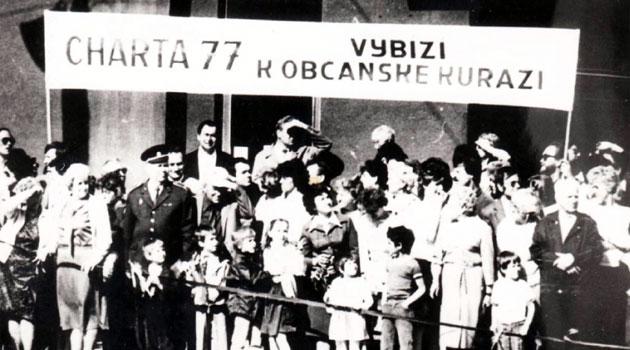Charter 77 veterans critique Czech Government for forgetting about human rights

The signatories of the Charter 77 document gathered in Prague’s Lucerna complex on the occasion of the 40th anniversary of its creation Saturday, as did other dissidents who played a key role in its organization. The conference, called “The Charter through Its Own Eyes”, was preceded by a celebration featuring not just recollections of the circumstances of the creation and operation of the opposition initiative, but also a critique of the current Czech Government as deviating away from an active defense of human rights abroad.
During the opening of Saturday’s conference, Daniel Kroupa, a philosopher, former MP and former Senator, criticized the cabinet of Czech Prime Minister Bohuslav Sobotka (Czech Social Democratic Party – ČSSD) for diverting attention away from advocating for the human rights agenda. Kroupa said he believed the Czech state had inherited a legacy, one he views as having long defended human rights.
“It is only with this Government that we have witnessed the state, for trade reasons, abandoning that legacy,” Kroupa said. He also recalled that Charter 77 and the dissident movement could not have existed without support from free countries abroad taking an interest in events inside Czechoslovakia.
“If an obligation arises from that, it is to continue in the same spirit vis-a-vis all cases where human rights are not recognized in the word,” Kroupa said. He also said society should push for the Czech Republic to return to its role as an active participant in the struggle for human rights.
The legacy of Charter 77 has been, according to the publicist and translator Petruška Šustrová, the same ever since it came about. “One must say what one believes and join together with like-minded people, but also, one must honor what others believe,” she said.
Šustrová said she finds the seeking of consensus to be lacking in today’s political life. “However, the Chartists had the advantage of never competing for elected office,” she added.
Sociologist Jiřina Šiklová said she believes Charter 77 demonstrated that it is possible to do something even in apparently intractable situations. “It was possible to come together, to form a common opinion, even at a time when most people believed it was impossible to do anything at all,” she told the Czech News Agency.
Šiklová compared the creation of Charter 77 to the aftermath of an earthquake, when some pick themselves up and begin aiding others to extricate themselves from the rubble. Another participant, philosopher and university educator Jan Sokol, said he believes Charter 77 was important during the events of 1989 and 1990 because the figures around it were legitimate in the eyes of the public and people trusted them.
“Today I see the biggest problem as this public lying in politics, that cannot be minimized and shouldn’t be swallowed. Public life must be subjected to the following of certain principles – for example, that politicians will not cynically lie. It is necessary today to insist on that, just like we did back then,” Sokol said.
The fact that many publicly active figures came from the Charter 77 circle was also highlighted by the lawyer and politician Petr Pithart. “I wrote up a list of the Chartists who have since appeared in and succeeded in political and state functions. It’s a terribly long list. That’s because those people had clean reputations. If somebody wants to achieve something in politics, then it is even more important to have a clean reputation than to have media talent or a political stance,” he said.
Journalist and politician Jan Ruml said be believes Charter 77 can inspire today’s young people with its moral message. “It came about under certain circumstances, during a certain time, today everything is absolutely different. However, if young people sense they are losing the democracy and freedom in this country, then in some other way – differently than Charter 77, but inspired by its moral message – they will extricate themselves from the current situation and come up with some type of resistance to it,” he said.
The Czech-Swedish nuclear physician František Janouch, who founded the Charter 77 Foundation, said he consider’s Charter 77’s main message to have been that it underlined the importance of civil society. “That is its biggest legacy – the importance and irreplaceability of civil society, even in a democratic regime,” he said.
The gathering of Chartists and dissidents culminated in a commemorative evening in the Marble Hall of Prague’s Lucerna complex. Performances featured songwriters Jaroslav Hutka and Dáša Vokatá and speeches by former spokespersons for Charter 77 such as Tomáš Hradílek, Dana Němcová and Alexandr Vondra.
The poems of the late Ivan Martin Jirous were also read. The Charter 77 society of people striving for human rights began to form during the trial of the musicians around the band The Plastic People of the Universe, of which Jirous was artistic director.
The initiators of the Charter gathered for the first time on 10 December 1976 and their first spokespersons were Jiří Hájek, a former Foreign Minister, the dramatist Václav Havel, and the philosopher Jan Patočka. Between Christmas and New Year, 242 people signed the Charter, and by January 1990 more than 1 800 people had joined.
